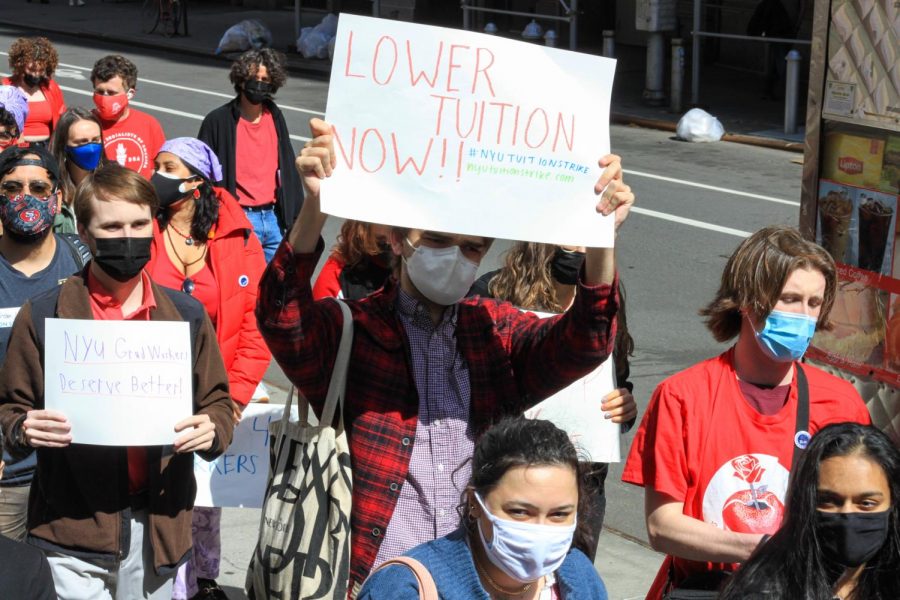Opinion: NYU YDSA strikes out
In the past, students have been willing to risk their degrees, lives and limbs for what they believe in. The NYU YDSA strike did not demonstrate that same resolve or organization.
Students with NYU YDSA protest for lower tuition on April 30. The organization’s spring 2021 tuition strike was canceled due to insufficient mobilization and concerns over de-enrollment. (Staff Photo by Alexandra Chan)
November 12, 2021
After several months of uncertainty, the NYU chapter of the Young Democratic Socialists of America announced that they were calling off their tuition strike.
When NYU YDSA said on April 30 that it would be organizing a tuition strike, students had a lot of questions. Chief among them was what a tuition strike would entail. As the chapter defined it, a tuition strike is a “deliberate and public refusal to pay that tuition to the university as a means of exacting certain concessions.” For NYU YDSA membership, this definition raised more questions than answers.
[Read more: NYU YDSA cancels tuition strike after failing to garner student interest]
This potential strike proved to be particularly problematic for YDSA members who pay tuition with student loans or scholarships, who wondered how they could directly participate in the strike. The answer is that you could not directly participate if you were fully on loans or scholarships. In other words, unless your family has the wealth to write an annual check to the university for almost $80,000, you couldn’t withhold that check to participate in the strike.
It’s not solidarity, but rather performative activism, when working-class people can’t participate in a strike that’s supposed to serve them.
NYU YDSA is right that strikes do work. However, when workers make the decision to strike, they make that decision knowing that it will stop their pay, freeze their benefits and risk their livelihood. In the past, student strikers have had to marshal a similar level of courage.
Four days after the beginning of the student strike of 1970, a movement calling for an end to the war in Vietnam, tragedy struck. In what became famous as the Kent State massacre, National Guard troops opened fire on a crowd of striking students, killing four and injuring nine on a university campus in Ohio. By the next week, an estimated 4 million students joined the strike at universities across the country, walking out of classrooms and staging all forms of protests at their campuses. These students risked not only their degrees but also their physical well-being.
However, you don’t have to look back to the Vietnam era to find another example worth following. Earlier this year, when teaching assistants with the Graduate Student Organizing Committee of NYU went on strike and won a new contract, they became a prime example for student organizers both inside and outside of the classroom.
Our TAs made incredible financial and personal sacrifices when they chose to strike, and they demonstrated that power that can come in numbers. By organizing a strike that not all students could participate in, NYU YDSA was doomed from the onset.
When NYU YDSA leadership was asked where they got their idea for a tuition strike, the chapter’s most senior co-chair, Jill Roberts, didn’t initially mention NYU TAs who just went on strike and won. Instead, she said the idea originated uptown at Columbia University. By the Columbia YDSA chapter’s own admission, it was “hard to say” whether or not their own tuition strike was a success.
In traditional strikes, organizers try to get as close to 100% participation as possible. A lack of solidarity was at the core of the tuition strike because working-class students could not participate.
NYU needs worker-based progressive action more now than at any other point in the university’s history. For example, as NYU barrels along with its 2031 expansion plan, construction is underway all around campus. For the most part, the people building these buildings could never practically afford to send their kids here. To make matters worse, NYU YDSA had previously rescheduled their strike from the fall to the spring, leaving working people waiting for their spring rendition of performative activism.
Real strikes require courage, but tuition strikes also require wealth. There are direct actions — sit-ins, marches and transportation stoppages — that young democratic socialists at NYU could have been organizing for the last year. Instead, NYU YDSA leadership insisted for so long upon sticking to a tuition strike that only the richest people in the university could participate in the first place.
Zach Banks is a member of the Democratic Socialists of America, but is not affiliated with NYU YDSA.
Contact Zach Banks at [email protected].























































































































































